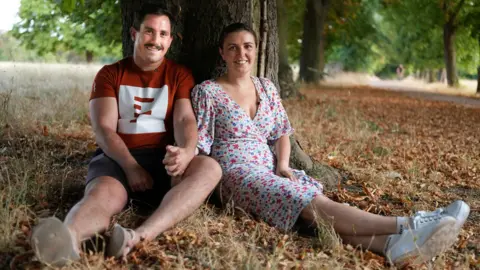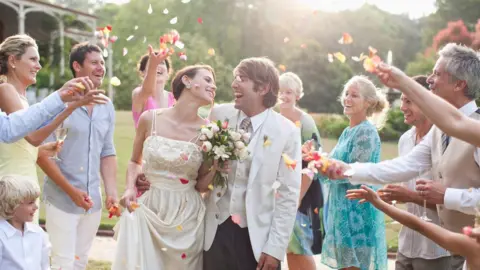Wedding laws need biggest shake-up since 19th Century - report
 Getty Images
Getty ImagesThe biggest shake-up to wedding laws since the 19th Century would give couples more choice, a government commissioned report has said.
The Law Commission described current rules around weddings as "confusing, out-of-date and restrictive".
It recommended a major overhaul that would mean couples could get married at beaches and private homes.
A Ministry of Justice spokesperson said it would "carefully review" the recommendations.
Opponents are concerned the changes could trivialise weddings and lead to the commercialisation of the ceremony.
'The perfect wedding day'
Chelsie Sills, 30, and Chris Hall, 31, are engaged and want to have a wedding with a celebrant from Humanists UK.
Under the current rules, Humanist weddings are not legally recognised in England and Wales, although the law has changed in Scotland and Northern Ireland. So they plan to have two ceremonies, one Humanist wedding, and another civil one to legally register their marriage.
For Chelsie, it would be "the perfect wedding day" if their Humanist ceremony could be recognised legally.
"If we wanted to get married in a church we'd be able to do it all in one. And we should be able to do that in a Humanist wedding ceremony.
 Chelsie Sills
Chelsie Sills"It isn't difficult to go and have a civil ceremony but it is added cost, added time and added planning. We don't really want our wedding to be a tick box exercise just to be able to sign on the dotted line."
"Humanism is about kindness, it's about rationality," Chris added. "Being able to have a Humanist wedding would be the closest to our belief system."
The proposals could mean that non-religious belief groups, such as Humanists, could have legally recognised weddings in England and Wales.
Andrew Copson, chief executive of Humanists UK, warned the proposals would take years to implement and urged the government to legally recognise Humanist weddings immediately.
"For thousands of couples it is hugely frustrating that something as uncontroversial as legal recognition for humanist marriages has been delayed for almost a decade," he said.
Current rules
In England and Wales couples must choose between a civil or religious ceremony with an officiant and specific wording, with no option for a legally-binding ceremony reflecting other beliefs.
In England and Wales most couples have to have the legal part of their wedding at a place of worship or a licensed venue.
But the Law Commission, which was asked by the government to review the rules around weddings in 2019, has recommended a range of reforms that would mean:
- regulation would focus on the officiant taking the ceremony, rather than the building
- there would be no legally prescribed form of words, so couples would be able to chose the content of their ceremony and where it took place, while religious groups still apply their own practices and traditions.
- the same laws would apply to all weddings, regardless of whether they were from a particular religion or not
 Getty Images
Getty Images'Devastating consequences'
The changes also try to address concerns that some weddings, including many religious ones, are not registered legally at all. This means if the couple separate they have no legal protections.
The report warned that "non-qualifying ceremonies are a growing issue within some Muslim communities" and said many people did not realise their religious wedding was not legally binding.
"The consequences on the end of the relationship can be devastating," the report said. "Those consequences are felt disproportionately by women and by the children of the relationship."
However the Law Commission acknowledged its recommendations would not solve the issue and urged the government to provide protection for couples who had not had a legal wedding ceremony, including couples who were cohabiting.
A Ministry of Justice spokesperson said: "We asked the Law Commission to review our current marriage laws to ensure this important institution continues to reflect modern society.
"We will carefully review these recommendations and respond in due course."

- NUTRITIONAL INTELLIGENCE: Do we subconsciously eat what our body needs?
- 'MUM RAGE' EXPLAINED: Could meltdowns signal a need for self-care?

